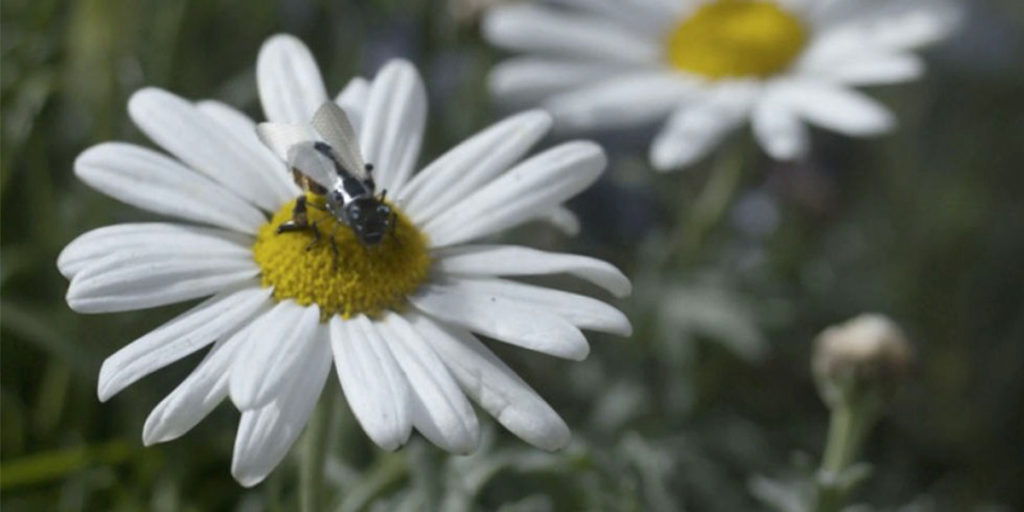Walmart Files Patent for Robot Bees
TECHNOLOGY, 2 Apr 2018
Lorraine Chow | EcoWatch – TRANSCEND Media Service
16 Mar 2018 – With the mass die-off of bees spelling trouble for agriculture, the world’s largest retailer has filed patents for the use of “unmanned vehicles,” or drones, to aid with pollination and crop production.
In U.S. Patent Office documents made public last week, Walmart has applied for six patents on drones designed to identify pest damage, spray pesticides and pollinate plants.
Reuters noted, “Walmart may see drone technology as one way to get food from farms to store shelves faster and more cheaply to compete with Amazon.com Inc, following its purchase of Whole Foods Market last year and the expansion of discount chains like Aldi and Lidl.”
Here’s what’s in the filings, according to CB Insights:
To track pests, Walmart describes using machine vision to monitor damage to crops as well as spot and identify the pests themselves. To prevent damage, the drones could shoot targeted sprays of pesticide or simply fly by to shoo off birds, acting as a next-generation of “scarecrows or shiny devices,” the patent notes.
Drones could spray pesticides across a more targeted set of crops, rather than the blanket approach used today. The patent notes that “chemical spraying of crops is expensive and may not be looked upon favorably by some consumers.”
Pollination drones, on the other hand, could help offset the loss of bee populations over the past few years. Walmart’s “applicators” would carry pollen from one plant to another, and use sensors to verify the transfer was successful.
Some have compared Walmart’s filing for drone pollinators to a horrifying Black Mirror episode on robot bees, but this technology isn’t completely unheard of.
httpv://www.youtube.com/watch?v=DSBb4VxJavE
“We’re always thinking about new concepts and ways that will help us further enhance how we serve customers, but we don’t have any further details to share on these patents at this time,” Walmart said in a statement to USA TODAY.
Last year, Japanese researchers successfully demonstrated how a tiny, remote-controlled drone could pollinate flowers.
An estimated 1,000 plants grown for food, beverages, fibers, spices and medicines must be pollinated by bees, bats and butterflies and other pollinators, according to Pollinator Partnership.
But in recent years, these vital creatures have been in trouble due to habitat loss, chemicals misuse, diseases and other hazards.
EPA Considers Allowing Bee-Killing Pesticide to Be Sprayed on 165 Million Acres of U.S. Farmland https://t.co/9YeOxOnJjL #EPA #neonicotinoids @NRDC @foodandwater @MomsRising @CleanAirMoms @billmckibben
— EcoWatch (@EcoWatch) December 19, 2017
_______________________________________________________________
Related Articles around the Web:
- Honey Bees Attracted to Glyphosate and a Common Fungicide ›
- Robot bees can fly, swim, and dive out of water using tiny rockets … ›
 Lorraine Chow is a reporter for EcoWatch.
Lorraine Chow is a reporter for EcoWatch.
DISCLAIMER: The statements, views and opinions expressed in pieces republished here are solely those of the authors and do not necessarily represent those of TMS. In accordance with title 17 U.S.C. section 107, this material is distributed without profit to those who have expressed a prior interest in receiving the included information for research and educational purposes. TMS has no affiliation whatsoever with the originator of this article nor is TMS endorsed or sponsored by the originator. “GO TO ORIGINAL” links are provided as a convenience to our readers and allow for verification of authenticity. However, as originating pages are often updated by their originating host sites, the versions posted may not match the versions our readers view when clicking the “GO TO ORIGINAL” links. This site contains copyrighted material the use of which has not always been specifically authorized by the copyright owner. We are making such material available in our efforts to advance understanding of environmental, political, human rights, economic, democracy, scientific, and social justice issues, etc. We believe this constitutes a ‘fair use’ of any such copyrighted material as provided for in section 107 of the US Copyright Law. In accordance with Title 17 U.S.C. Section 107, the material on this site is distributed without profit to those who have expressed a prior interest in receiving the included information for research and educational purposes. For more information go to: http://www.law.cornell.edu/uscode/17/107.shtml. If you wish to use copyrighted material from this site for purposes of your own that go beyond ‘fair use’, you must obtain permission from the copyright owner.
